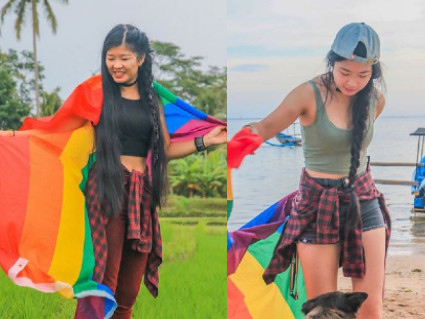This lesbian singer-songwriter is the living embodiment of why queer representation is so important

Kai Mata (Instagram)
Kai Mata, a lesbian singer-songwriter from Indonesia has hit out at the “massive discrimination and deep-rooted homophobia” in her home country.
The 22-year-old writes about her sexuality in her music and strives to be visible in an effort to counter the prejudice LGBT+ people face.
She said that as she was realising her sexuality as a teenager, “there seemed to be no support networks in place, and no one I knew in Indonesia was openly gay, bisexual – or anything but straight”.
“It felt so isolating and frightening,” she told the South China Morning Post. “I grew up to recognise the importance of visibility for minorities, and I have become a visible part of the LGBTQ+ community.”
Mata grew up in Jakarta but moved to Bali as it is more accepting of LGBT+ people. However, things are not perfect there either, she acknowledged.
“We still face massive discrimination and deep-rooted homophobia,” she said.
Lesbian singer-songwriter Kai Mata gets hate for her activism.
Mata has been vocal in her opposition to anti-LGBT+ laws in Indonesia, and she has been on the receiving end of hateful online comments for her activism.
“I’d say on average it’s an equal amount of hateful comments to positive, though recently I’ve seen an influx of anti-LGBTQ+ hate speech spewed my way,” she said.
“On most days, I simply brush it off, as internalising their words serves no purpose for my mission.”
She has received reams of online abuse from people who say she should be “cured” of her sexuality, with some people saying she should be killed.
“But I carry on, because my message isn’t for the ones who incite bigotry and hate,” she said.
“Their hate shows me why I choose to love, for it seems like a much better, more fulfilling life I’ve chosen compared to theirs.”
I grew up to recognise the importance of visibility for minorities, and I have become a visible part of the LGBTQ+ community.
Luckily, Mata has supportive and accepting parents who have embraced her identity.
“I want to ensure everyone knows they are valued, respected and loved,” Mata added.
“It’s a mission of mine to remind us all that regardless of our external differences, we can empathise and relate with the human experience: the bright lights to the shadows it casts, the darkest depths to the mountaintops, and the innocent beginnings to the inevitable ends.”
A new bill could jeopardise the rights of LGBT+ people in Indonesia even further.
Although the island of Bali has historically been seen as one of the most tolerant places in country, in general discrimination and violence against LGBT+ people is on the rise in Indonesia.
Gay sex is currently legal in most regions of the country, including Bali, but there are no discrimination protections for LGBT+ people and same-sex relationships are not recognised.
In recent months, legislators have put forward a “Family Resilience Bill” which would force LGBT+ people into government sanctioned “rehabilitation centres” for “treatment”.
The law would also mean that family members of LGBT+ people would be compelled to report them to authorities if they didn’t voluntarily submit to treatment.
The draft bill also says LGBT+ people are a “threat” to the traditional family structure and likens being gay to incest and sadomasochism.

